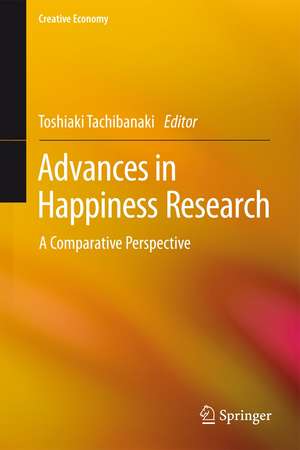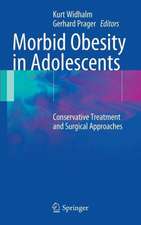Advances in Happiness Research: A Comparative Perspective: Creative Economy
Editat de Toshiaki Tachibanakien Limba Engleză Hardback – 30 ian 2016
| Toate formatele și edițiile | Preț | Express |
|---|---|---|
| Paperback (1) | 643.84 lei 6-8 săpt. | |
| Springer – 31 mar 2018 | 643.84 lei 6-8 săpt. | |
| Hardback (1) | 577.17 lei 38-45 zile | |
| Springer – 30 ian 2016 | 577.17 lei 38-45 zile |
Preț: 577.17 lei
Preț vechi: 721.47 lei
-20% Nou
Puncte Express: 866
Preț estimativ în valută:
110.45€ • 115.17$ • 91.80£
110.45€ • 115.17$ • 91.80£
Carte tipărită la comandă
Livrare economică 17-24 martie
Preluare comenzi: 021 569.72.76
Specificații
ISBN-13: 9784431557524
ISBN-10: 4431557520
Pagini: 300
Ilustrații: XX, 344 p. 38 illus., 21 illus. in color.
Dimensiuni: 155 x 235 x 21 mm
Greutate: 0.69 kg
Ediția:1st ed. 2016
Editura: Springer
Colecția Springer
Seria Creative Economy
Locul publicării:Tokyo, Japan
ISBN-10: 4431557520
Pagini: 300
Ilustrații: XX, 344 p. 38 illus., 21 illus. in color.
Dimensiuni: 155 x 235 x 21 mm
Greutate: 0.69 kg
Ediția:1st ed. 2016
Editura: Springer
Colecția Springer
Seria Creative Economy
Locul publicării:Tokyo, Japan
Public țintă
ResearchCuprins
1 Introduction.- Part I: Issues in Happiness Research—Concepts, Measurement and Interpretation.- 2 Happiness: Research and Policy Considerations (Bruno Frey and Jana Gallus).- 3 The ‘Wicked Problem’ of Wellbeing: Theorising the Prospects for Policy Change (Ian Bache and Louise Reardon).- 4 An Overview of Intertemporal Measures of Individual Well-being: Can They Explain Life Satisfaction Better? (Conchita D'Ambrosio).- 5 The Importance of ‘Domain Importance’ for Happiness Economics (Tim Tiefenbach and Florian Kohlbacher).- 6 Adaptation and the Easterlin Paradox (Andrew Clark).- Part II: Income Inequality, Employment, and Happiness.- 7 Comparative Study of Happiness and Inequality in Five Industrialized Countries (Toshiaki Tachibanaki and Sayaka Sakoda).- 8 Happiness, Social Cohesion and Income Inequalities in Britain and Japan (Dimitris Ballas, Danny Dorling, Tomoki Nakaya, Helena Tunstall, Kazumasa Hanaoka and Tomoya Hanibuchi).- 9 Happiness and Employment Status (Tadashi Yagi, Katsuhiko Yonezaki and Kunio Urakawa).- 10 The Impact of Employment System on Feeling of Happiness in Germany and Japan (Toshiyuki Shirakawa).- 11 Effects of Paid and Unpaid Overtime Work on Stress, Earnings and Happiness (Akira Kawaguchi and Takato Kasai).- Part III: Societal Issues and Happiness.- 12 Why Do Japanese Parents and Their Young Adult Children Live Together? (Kei Sakata and C.R. McKenzie).- 13 Anticipation of Life Satisfaction before Emigration Evidence from German Panel Data (Marcel Erlinghagen).- 14 Does City Size affect Happiness? (Yoshio Itaba).- 15 Can Work-Life Balance Policies Foster Happiness within the Family?A Comparison of Traditional versus New Family Arrangements (Álvaro Martínez-Pérez).- 16 Accessing Suicidal Ideation fromResponses to Queries on Subjective Well-being (Susumu Kuwahara, Teruyuki Tamura, Akiko Kamesaka and Toshiya Murai).- 17 Do the Arts and Culture Have a Positive Impact on Happiness? Beyond Methodological Issues (Nobuko Kawashima).- 18 Arts and Happiness (Lasse Steiner).
Notă biografică
Editor
Tachibanaki, Toshiaki is a professor in Faculty of Economics at Doshisha University and the Director of the Life Risk Research Center. He holds a Ph.D. in Economics, awarded by The Johns Hopkins University in 1973. He has held teaching and research positions at INSEE, OECD, Osaka University, Kyoto University, Stanford University, University of Essex, London School of Economics. He has also served as a director of research groups in the Economic Planning Agency, Bank of Japan, Ministry for Posts and Telecommunication, Ministry of Finance, and Ministry of International Trade and Industry. His research interests cover labor economics, public and financial economics, applied econometrics, economic theory and the Japanese economy.
He is the author of many books including those written in English such as “Capital and Labour in Japan: The Functions of Two Factor Markets” (2012), “The New Paradox for Japanese Women: Greater Choice, Greater Inequality” (2010), “Confronting Income Inequality in Japan: A Comparative Analysis of Causes, Consequences, and Reform” (2009). He has published extensively in journals such as International Economic Review, Review of Economics and Statistics, Journal of Public Economics, Nihon Rodo Kyokai Zasshi, European Economic Review and Financial Review.
Tachibanaki, Toshiaki is a professor in Faculty of Economics at Doshisha University and the Director of the Life Risk Research Center. He holds a Ph.D. in Economics, awarded by The Johns Hopkins University in 1973. He has held teaching and research positions at INSEE, OECD, Osaka University, Kyoto University, Stanford University, University of Essex, London School of Economics. He has also served as a director of research groups in the Economic Planning Agency, Bank of Japan, Ministry for Posts and Telecommunication, Ministry of Finance, and Ministry of International Trade and Industry. His research interests cover labor economics, public and financial economics, applied econometrics, economic theory and the Japanese economy.
He is the author of many books including those written in English such as “Capital and Labour in Japan: The Functions of Two Factor Markets” (2012), “The New Paradox for Japanese Women: Greater Choice, Greater Inequality” (2010), “Confronting Income Inequality in Japan: A Comparative Analysis of Causes, Consequences, and Reform” (2009). He has published extensively in journals such as International Economic Review, Review of Economics and Statistics, Journal of Public Economics, Nihon Rodo Kyokai Zasshi, European Economic Review and Financial Review.
Textul de pe ultima copertă
This edited volume makes a contribution to the literature on happiness research by compiling studies based on cross-national research and from diverse academic disciplines. The book is distinctive in that it contains both theoretical and empirical analyses, investigating relationship between causes of happiness and economic behavior relating to employment, consumption, and saving. Most notably, it is one of the first studies in this subject area that analyzes micro data collected in Europe, US and Japan with information on respondents’ attributes and their economic behavior, as well as in measuring inter-temporal happiness by principal factor analysis. Research findings in this volume shed new light on public policies for a number of areas such as employment, family, social welfare, urban and regional planning, and culture. The book draws on a collaborative research project between five institutions of higher education in France, UK, Germany, Switzerland, Belgium, and Japan that lasted for two years.
Caracteristici
One of the first studies in happiness studies that analyzes micro data collected in Europe, US and Japan with information on respondents’ attributes and their economic behavior, as well as in measuring inter-temporal happiness by principal factor analysis Adopts interdisciplinary approaches including economics, politics, sociology, and cultural policy Contains both theoretical and empirical analyses and includes policy implications






















